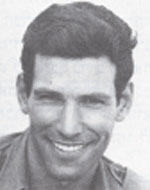Amikam, son of Dvora and Rafael, was born on May 15, 1948, in Kibbutz Mizra, he studied at the kibbutz elementary school, and later continued his high school studies at the educational institution there. In his youth, Amikam was invited to the President’s Residence, and he did not brag about it and let his friends feel that the invitation was also in their honor. He was a literary and artistic lover and aspired to be a theater director Amikam was very energetic and tolerant and was ready to take on many roles: he was naturally full of life and loved life, his spirit was strong and his sense of humor stood in difficult situations. While he was settled and quiet, he was always alert and fighting against wrongs and injustice, while he struggled for his group not to get symbols from the movement because he thought they don’t deserve them yet, Amikam was modest in his ways and never tried to stand out. he had both inner and outer beauty. During the period he completed his studies at the educational institution, he was considered a favorite of the girls and was known as the most beautiful young man of the class. Amikam knew how to make friends. Many liked his smiling face and he was called “Amikam the country.” Amikam was drafted into the Israel Defense Forces in early November 1966. After completing basic training, he participated in the Six Day War in the battles of Sinai as a tank-loader in the tank, and was shocked by what he saw. Was appointed commander of a tank in the Armored Corps, and was sent to the officers’ course for the Armored Corps and Armored Corps officers, and later was appointed commander of a tank division in one of the corps units. In this capacity, his commander assessed him as a very good officer, responsible, very efficient and capable of leadership, and was later promoted to lieutenant. In his release certificate he was noted as a very good officer, responsible, efficient and entrepreneurial. After completing his regular service, he was assigned to reserve duty in the same battalion. During his reserve duty, his commanders also noted him as an exceptionally dedicated and responsible officer, alert and showing excellent resourcefulness in complex situations. After the liberation, Amikam returned to Mizra. A year later, however, he decided to leave the kibbutz, wanting to know the city’s life and travel the world. His motives for leaving the kibbutz and his actions and feelings in the city, was interviewed in the newspaper Mizra, on the list called “ballad to leave – kibbutz.” At first he engaged in fishing with a partner, but when he failed, he went to work in heavy equipment at Oron. After that, he worked for a private contractor in Jerusalem, coordinating areas on Mount Scopus. At that time he began to take the matriculation exams. In 1972, Amikam married his girlfriend Esti and lived with her in Ramat Gan. He began to study social work at Bar Ilan University and was able to study for one year. When the Yom Kippur War broke out, Amikam was called to his unit and participated as a platoon commander in the battle against the Egyptians in the Sinai. According to his comrade, he stood under the pressure of the fighting with exemplary coolness and even joked with the radio in the fire and the distress of the battle. On the 9th of Tishrei 5734 (October 9, 1973), during the battle of braking on the Rafidim-Ismailia axis in the central sector of Sinai, after his battalion captured Hamutal, Amikam was wounded and killed. He was brought to eternal rest in the cemetery in Mizra. He left behind a wife, parents and two sisters. After his fall, he was promoted to captain. In a letter of condolence to the bereaved family, the unit commander wrote: “Your son displayed courage and sacrifice during the battles. And commanded his unit calmly with courage and self control. “
